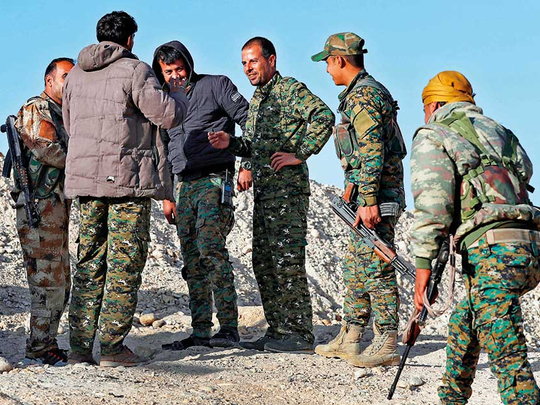
London: The Trump administration is renewing an effort to replace US troops in Syria with an Arab force, but the proposal faces substantial obstacles and could potentially exacerbate the conflict .
The Saudi foreign minister, Adel al-Jubeir, said his government was talking to Washington about raising such a force , confirming a report in the Wall Street Journal earlier this week that said the new US national security adviser , John Bolton, had called the Egyptian intelligence chief, Abbas Kamel, to ask Cairo to play a part in building one. Such a move poses great risks for the region and poses important questions:
Can Arab nations spare the manpower?
There are about 2,000 US troops in Syria fighting Daesh, but Donald Trump has repeatedly expressed a desire to withdraw them .
The idea of an Arab coalition force playing a role in Syria to combat extremist groups and contain Iranian influence has surfaced several times since 2015, but faces several problems.
Saudi Arabia and the United Arab Emirates are bogged down in a brutal war in Yemen, and have little manpower and few military resources to spare.
They are also locked in a dispute with Qatar , another potential contributor to a force, while Egypt is much closer to the regime of Bashar Al Assad in Syria than its would-be Gulf partners.
The Obama administration also looked at the possibility of Arab allies deploying counter-terrorist forces against Isis in Syria, but Saudi Arabia and the UAE were drawn into the battle for Yemen against Iranian-backed Al Houthi miltants.
Nicholas Heras, a fellow at the Centre for a New American Security, said: “They preferred to send intelligence officers and money, rather than put troops on the ground.
“But for the Saudis, the trouble is their territory is being breached by Al Houthis every day. It doesn’t make sense for them to shift their ground forces when they have trouble securing their own border.”
Heras said it was more likely Saudi Arabia would seek to outsource recruitment to countries such as Pakistan and Sudan. “I’m sure the Saudis are up for fighting in Syria to the very last Sudanese soldier,” he said.
What would such a force look like?
Middle East experts said it was feasible Arab states could fund an army run by private contractors and possibly help recruit soldiers from developing countries such as Sudan.
Erik Prince, a Trump ally who founded the military contractor Blackwater USA and now advises the UAE, is lobbying to play a role, according to the Wall Street Journal.
A similar offer he made last year to replace US troops with private contractors in Afghanistan was turned down by the Pentagon.
But Prince may have more traction in the White House over Syria. Bolton has argued that the US has taken too much of the military burden in Syria and Arab states should supply troops and material assistance in the fight against Daesh.
Saudi crown prince, Mohammad Bin Salman, has launched an Islamic military counter-terrorism coalition , which held its first high-level meeting last year, but it has not appeared to be intended for combat.
Charles Lister, the director of the extremism and counter-terrorism programme at the Middle East Institute (MEI), attended the inaugural conference and said the force was intended for training and assistance programmes, rather than combat operations.
Lister said there was “no precedent” for an Arab expeditionary force in Syria.
Any Saudi troops deployed to Syria would find themselves directly confronting Iranian fighters and their allies , which could prompt a dangerous escalation in the conflict.
Randa Slim, who directs the back-channel Track II diplomacy programme at MEI said: “It is one thing for the Saudis to pay for other ‘Islamic forces’ to do the job, and a totally different thing to send their men to a conflict theatre where they are bound to enter into direct confrontation with an entrenched Iranian-Hezbollah force.
Is the Syria war really an Arab conflict?
Currently ground events in Syria are being dictated by external powers, none of which are Arab.
The leaders of Iran, Russia and Turkey met earlier this month for high-level talks to end the Syrian war, cementing their influence on the outcome of the conflict and isolating the United States from the region’s most crucial diplomacy initiative. The three Presidents — Recep Tayyip Erdogan of Turkey, Iran’s Hassan Rouhani and Russia’s Vladimir Putin — gathered in the Turkish capital, Ankara, where made important decisions about Syria’s future essentially making deals to defact divide Syria into areas of influence amongst themselves.
The Iranians are interested in areas near the Lebanese and Iraqi border where it wants to leave open a clear ground bridge to deliver weapons to its proxy, the Lebanese militant group Hezbollah.
Russia is interested in a warm water port on the Mediterranean where it already has a naval port in Tartus and is building other military bases elsewhere. Turkey, of course, wants to be in control of the Kurdish-majority northern areas, where it sees an existential threat in nationalist aspirations of Syria’s Kurds, which could incite Turkey’s own sizeable Kurdish population creating a threat to the government in Ankara.
An Arab force will unlikely be equipped, united or determined enough to fill any vacuum left by a US troop withdrawal.
It is also unfair for the Arabs to be handed such a monumental task when outside players are largely to blame for enflaming and encouraging the conflict in Syria.
The Arabs stepped out of Syria a while back, so piecing the country back together, should be tasked to those responsible for helping break Syria.
-With inputs from The Guardian












